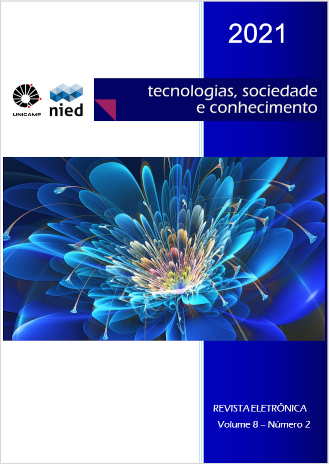Abstract
This article presents the results of a research developed with the aim of analyzing how the concepts of Computational Thinking (PC) can be associated, in practice, with the fundamental skills / resources of Mathematics in the 6th year of Elementary School II, according to the competence of the National Base Common Curriculum (BNCC). Study activities that involved an integration of PC with 6th grade Mathematics were elaborated and made available to a group of teachers, members of the expert panels for analysis. The results showed that we can infer that the inclusion of Computing in Basic Education not only brings benefits for the development of several skills, but it can also provide the development of the PC for problem solving, the construction of new knowledge, methods and strategies to work reasoning and abstractions in any area of knowledge.
References
ALBERTI, T. F. et al. Dinâmicas de grupo orientadas pelas atividades de estudo: desenvolvimento de habilidades e competências na educação profissional. Revista Brasileira de Estudos Pedagógicos, Brasília, v. 95, n. 240, p. 346-362, mai./ago. 2014. Disponível em: https://www.scielo.br/pdf/rbeped/v95n240/06.pdf. Acesso em: 16 fev. 2020.
BRACKMANN, C. P. Desenvolvimento do pensamento computacional através de atividades desplugadas na educação básica. 2017. 226f. Tese (Doutorado em Informática na Educação) - Universidade Federal do Rio Grande do Sul, Porto Alegre, 2017. Disponível em: https://lume.ufrgs.br/handle/10183/172208. Acesso em: 18 fev. 2020.
BRASIL. Ministério da Educação. Base Nacional Comum Curricular (BNCC). Brasília: MEC, 2018. 600 p. Disponível em: http://basenacionalcomum.mec.gov.br. Acesso em: 01 maio 2020.
FERREIRA, J. S. P. Atividades de metodologias ativas para matemática com elementos didáticos da BNCC. Revista Brasileira de Pós-Graduação, Brasília, v. 16, n. 35, p. 1-22, jun. 2020. Disponível em: http://ojs.rbpg.capes.gov.br/index.php/rbpg/article/view/1706. Acesso em: 09 jan. 2020.
FRANÇA, R. S.; TEDESCO, P. C. A. R. Desafios e oportunidades ao ensino do pensamento computacional na educação básica no Brasil. In: CONGRESSO BRASILEIRO DE INFORMÁTICA NA EDUCAÇÃO, 4., 2015, Maceió. Anais [...]. Maceió: SBC, 2015. p. 1464-1473. Disponível em: https://www.br-ie.org/pub/index.php/wcbie/article/view/6331. Acesso em: 10 nov. 2020.
GAYDECZKA, B.; MASSA, N. P. Uma revisão de estudos sobre o Pensamento Computacional e Scratch no Brasil. Ensino & Pesquisa, União da Vitória, v. 18, n. 1, p. 31-62, jan./abr. 2020. Disponível em: http://periodicos.unespar.edu.br/index.php/ensinoepesquisa/article/view/2959. Acesso em: 07 set. 2020.
LAMEU, L. R. G. A transição do aluno do 5º ano para o 6º ano do ensino fundamental: articulações para superação das dificuldades de adaptação e aprendizado. Jacarezinho: Secretaria de Estado da Educação do Paraná, 2013. Disponível em: http://www.diaadiaeducacao.pr.gov.br/portals/cadernospde/pdebusca/producoes_pde/2013/2013_uenp_ped_pdp_leide_rozani_gaioto_lameu.pdf. Acesso em: 23 jul. 2020.
LIKERT, R. A technique for the measurement of attitudes. Archives of Psychology, [S. l.], v. 22, n. 140, p. 5-55, jun. 1932. Disponível em: https://legacy.voteview.com/pdf/Likert_1932.pdf. Acesso em: 18 out. 2019.
LIMA, C. P.; SEKKEL, M. C. A promoção da atividade de estudo: repercussões para a organização do ensino. Psicologia Escolar e Educacional, São Paulo, v. 22, n. 2, p. 403-411, mai./ago. 2018. Disponível em: https://www.scielo.br/pdf/pee/v22n2/2175-3539-pee-22-02-403.pdf. Acesso em: 22 abr. 2020.
PAULA, A. P. et al. Transição do 5º para o 6º ano no ensino fundamental: processo educacional de reflexão e debate. Revista Ensaios Pedagógicos, Curitiba, v. 8, n. 1, p. 33-52, jul. 2018. Disponível em: http://www.opet.com.br/faculdade/revista-pedagogia/pdf/v8/v8-artigo-3-TRANSICAO-DO-5-PARA-O-6-ANO-NO-ENSINO-FUNDAMENTAL.pdf. Acesso em: 09 dez. 2019.
PEREIRA, F. T. S. S.; ARAÚJO, L. G.; BITTENCOURT, R. Intervenções de pensamento computacional na educação básica através de computação desplugada. In: CONGRESSO BRASILEIRO DE INFORMÁTICA NA EDUCAÇÃO, 8.; WORKSHOP DE INFORMÁTICA NA ESCOLA, 25., 2019, Rio de Janeiro. Anais [...]. Rio de Janeiro: NCE - UFRJ, 2019. p. 315-324. Disponível em: https://www.br-ie.org/pub/index.php/wie/article/view/8518. Acesso em: 22 ago. 2020.
RIBEIRO, L.; FOSS, L.; CAVALHEIRO, S. A. C. Pensamento computacional: fundamentos e integração na educação básica. In: CONGRESSO BRASILEIRO DE INFORMÁTICA NA EDUCAÇÃO, 8.; JORNADA DE ATUALIZAÇÃO EM INFORMÁTICA NA EDUCAÇÃO, 8., 2019, Brasília. Anais [...]. Brasília: SBC, 2019. p. 25-63. Disponível em: https://www.br-ie.org/pub/index.php/pie/article/view/8699. Acesso em: 19 ago. 2020.
RODRIGUEZ, C. L. et al. Pensamento Computacional: transformando ideias em jogos digitais usando o Scratch. In: WORKSHOP DE INFORMÁTICA NA ESCOLA, 21., 2015, Rio de Janeiro. Anais [...]. Rio de Janeiro: NCE - UFRJ, 2015. p. 62-71. Disponível em: https://br-ie.org/pub/index.php/wie/article/view/4992. Acesso em: 22 ago. 2020.
SANTANA, B. L.; ARAÚJO, L. G. J.; BITTENCOURT, R. A. Computação e eu: uma proposta de educação em Computação para o sexto ano do Ensino Fundamental II. In: WORKSHOP
SOBRE EDUCAÇÃO EM COMPUTAÇÃO, 27, 2019, Porto Alegre. Anais [...]. Porto Alegre: SBC, 2019. p. 21-30. Disponível em: https://sol.sbc.org.br/index.php/wei/article/view/6613. Acesso em: 05 mar. 2019.
SILVESTRE, B. S.; CEDRO, W. L. A atividade coletiva na formação inicial do professor de matemática: a elaboração do jogo como tarefa. In: CONFERÊNCIA INTERAMERICANA DE EDUCAÇÃO MATEMÁTICA, 15., 2019, Medellín. Anais [...]. Medellín: Universidad de Medellín; Universidad de Antioquia, 2019. Disponível em: https://conferencia.ciaem-redumate.org/index.php/xvciaem/xv/paper/view/84. Acesso em: 16 mar. 2020.
SOARES, M. J.; PORTO, A. P. T. Expectativas de Alunos do Ensino Médio de Rondonópolis-MT quanto ao uso de Tecnologias Digitais na sua Formação. ReTER, v.2, n.1, 2021.
SOUZA, D. S.; DIAS, J.; SANTOS, K. S. Não ligue o computador: a computação desplugada como estratégia metodológica para o desenvolvimento do pensamento computacional na educação básica - uma revisão sistemática da literatura. Renote - Revista Novas Tecnologias na Educação, Porto Alegre, v. 17, n. 3, p. 1-10, 2019. Disponível em: https://seer.ufrgs.br/renote/article/view/99526. Acesso em: 18 dez. 2019.
WING, J. M. Computational thinking. Communications of the ACM, [S. l.], v. 49, n. 3, p. 33-35, mar. 2006. Disponível em: https://www.cs.cmu.edu/~15110-s13/Wing06-ct.pdf. Acesso em: 26 mar. 2020.

This work is licensed under a Creative Commons Attribution 4.0 International License.
Copyright (c) 2022 Tecnologias, Sociedade e Conhecimento


